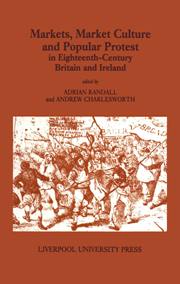Book contents
- Frontmatter
- Contents
- Contributors
- Preface
- 1 Markets, Market Culture and Popular Protest in Eighteenth-Century Britain and Ireland
- 2 Popular Protest and the Persistence of Customary Corn Measures: Resistance to the Winchester Bushel in the English West
- 3 The Jack-a-Lent Riots and Opposition to Turnpikes in the Bristol Region in 1749
- 4 The Cider Tax, Popular Symbolism and Opposition in Mid-Hanoverian England
- 5 Scarcity and the Civic Tradition: Market Management in Bristol, 1709–1815
- 6 The Moral Economy of the English Middling Sort in the Eighteenth Century: the Case of Norwich in 1766 and 1767
- 7 Oxford Food Riots: a Community and its Markets
- 8 The Irish Famine of 1799–1801: Market Culture, Moral Economies and Social Protest
- Index
4 - The Cider Tax, Popular Symbolism and Opposition in Mid-Hanoverian England
- Frontmatter
- Contents
- Contributors
- Preface
- 1 Markets, Market Culture and Popular Protest in Eighteenth-Century Britain and Ireland
- 2 Popular Protest and the Persistence of Customary Corn Measures: Resistance to the Winchester Bushel in the English West
- 3 The Jack-a-Lent Riots and Opposition to Turnpikes in the Bristol Region in 1749
- 4 The Cider Tax, Popular Symbolism and Opposition in Mid-Hanoverian England
- 5 Scarcity and the Civic Tradition: Market Management in Bristol, 1709–1815
- 6 The Moral Economy of the English Middling Sort in the Eighteenth Century: the Case of Norwich in 1766 and 1767
- 7 Oxford Food Riots: a Community and its Markets
- 8 The Irish Famine of 1799–1801: Market Culture, Moral Economies and Social Protest
- Index
Summary
The peace is good—who dare dispute the fact?
See the fruits thereof—the Cyder Tax.
On 10 February 1763, Britain signed the Peace of Paris which successfully concluded the Seven Years War. Victory, however, proved costly. The war raised the National Debt to an unprecedented £146 million, of which only £137 million was funded. The result was that the Treasury faced annual debt interest payments of£4.7m. The embattled Prime Minister, the Earl of Bute, his low standing in national esteem slightly raised by the ending of the war, and his Chancellor of the Exchequer, Sir Francis Dashwood, faced a daunting fiscal challenge. Their solution was to impose an Act to raise the excise duty payable on cider and perry.
The decision to raise much-needed revenue by a tax upon one specific commodity of consumption focused the burden squarely upon the ‘cider counties’ of Cornwall, Devon, Gloucestershire, Herefordshire, Monmouthshire, Somerset and Worcestershire. This was not accidental since it was calculated that these counties paid the least in a compounding of the Land and Malt Tax. The sense that one region was being singled out to fund the debt incurred by the war aroused considerable and immediate anger there.
It was not, however, simply the fact that cider and perry were the government's chosen targets for raising revenue which provoked protest. A tax had been levied on cider since 1643 and had subsequently been amended on three occasions.
- Type
- Chapter
- Information
- Publisher: Liverpool University PressPrint publication year: 1996

